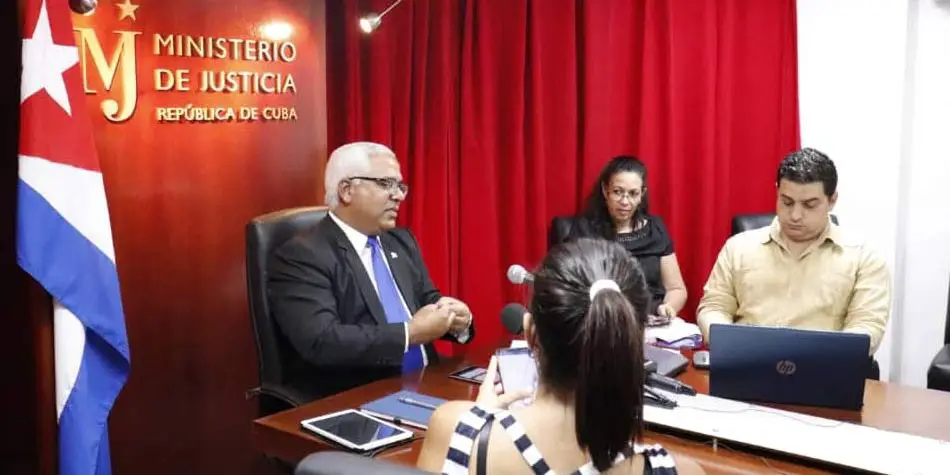
China signed an agreement with Cuba on Monday that specifies the collaboration between the two in terms of cybersecurity, as they had announced last November. Prensa Latina agency broke the news celebrating that this agreement establishes the bases to build “an internet based on the development and well-being of the peoples”.
The agreement, which bears the signatures of Mayra Arevich, Minister of Communications of Cuba, and Cao Shuming, representative of the Cyberspace Administration of China, took place within the framework of a mission of Cuban officials to Beijing, led by Vice Prime Minister Jorge Luis Perdomo.
In an interview with Prensa Latina, Perdomo assured that together with China they are working to strengthen the development of telecommunications in third and fourth generation networks -3G and 4G-, as well as broadband, whose deployment, the official added, has not been completed because it depends on economic capacity of the island.
For this, he said, “Chinese entities and collaboration with China is vital.” The meetings also reviewed the “actions” to continue with the digital terrestrial television program, a project that the Island began in 2013 with the support of Beijing.
Information and communication technologies are “also platforms for political destabilization, imperialist aggression in our country, political and ideological subversion”
Ties with China in cybersecurity go “beyond a business relationship,” and are seen “as a long-term strategic relationship” in the economic and national security fields, the vice premier said. He added that it is taken into account that information and communication technologies are “also platforms for political destabilization, imperialist aggression in our country, political and ideological subversion.”
As is known, the Asian giant maintains tight control over the Internet, with a body specifically dedicated to it, considered the largest and most sophisticated. Suffice it as an example battalion of employees that 24 hours a day is dedicated to reviewing any content and page that can reach a wide audience.
None of this is mentioned in the official Cuban press, whose deputy prime minister assures that the island defends the sovereignty of each country to build a technological infrastructure that “can use it for its political, economic and social development,” as well as “communicate” with other nations but safeguarding “their national identity and values”.
The agreement occurs in the context of the United States sanctions on various Chinese companies, such as ByteDance, owner of TikTok, due to the repercussions it may have for their security. The Asian firm is accused of leaking data of US citizens to Beijing.
The official press pointed out that the Cuban delegation’s agenda has included meetings with the executive vice president of the China Development Bank, Wang Weidong, as well as with the president of the Credit Insurance Corporation, Sheng Hetai. In addition, a meeting was held with Han Fangming, president and founder of Charhar, an institute that defines itself as a think tank of “high professional ethics and global vision”, dedicated to promoting the discourse of China’s policies in the international community.
The tour, which began on Thursday of last week, has also included visits to Information Technology and Industries, the International Development Agency and the National Health Commission. A visit to Changchun, in Jilin province, and a tour of the Changheber joint venture were scheduled for this Tuesday.
The tour, which began on Thursday of last week, has also included visits to Information Technology and Industries, the International Development Agency and the National Health Commission.
The new rapprochement of the Cuban authorities with China comes five months after Miguel Díaz-Canel met with his counterpart Xi Jinping, in November 2022, in a desperate search for financing in the midst of an economic and energy crisis. At that meeting it was agreed disbursement of 100 million dollars to reactivate important lines of industrial activity on the Island, the generation of renewable energy and cybersecurity.
The relations between Cuba and China for cooperation in cyberspace is not new and there are indications that date back to 2014, long before the Government authorized Internet access on mobile phones. Nine years ago, Beijing and Havana signed an agreement for the development of laws and regulations.
In 2014, one of the concerns of then President Raúl Castro was the “existence of a global system of telecommunications espionage” by the United States. Since then, according to various articles in the official press, the Cuban government has had more rapprochement with the Chinese side and the issue has been on the negotiating table.
While the government in Havana touts the use of the internet for development, the state monopoly Etecsa maintains control of telecommunications and restricts the service of telephone lines to people considered of interest.
In addition to China, in 2018, the Cuban IT solutions company Softel signed an agreement with the Russian Inoventica to build a regional cybersecurity center in Havana, although after this signing the official press has maintained total silence on the subject.
Last week an agreement was also finalized between Havanatur and the Chinese tour operator Tumei International Travel to promote the Island in the Asian market as a “reliable and safe” destination. According to Rodrigo Wen, deputy general manager of Tumei, Cuba is a priority on its agenda and is among the 20 states approved by Beijing to allow group travel after reopening its borders after three years of confinement due to covid-19.
________________________
Collaborate with our work:
The team of 14ymedio He is committed to doing serious journalism that reflects the reality of deep Cuba. Thank you for accompanying us on this long road. We invite you to continue supporting us, but this time making you a member of our newspaper. Together we can continue transforming journalism in Cuba.















